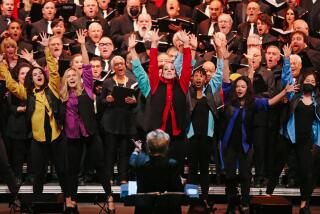MUSIC REVIEW : Raub’s Farewell Full of Drama
- Share via
TUSTIN — For Richard Raub’s farewell performance as director of the Orange Coast Singers, overall theatricality, rather than subtleties of expression, ruled the occasion.
The program--for which 13 alumni singers joined the 34-member group Saturday night at Red Hill Lutheran Church--lent dramatic closure to Raub’s 23-year tenure on the Orange Coast College faculty.
Choral dynamic levels in Mozart’s “Grand” Mass in C minor, K. 427--the primary vehicle of the evening, presented in its original, incomplete form--alternated between mezzo piano and fortissimo, mostly tending toward the latter. With little attention to possible shading, the choruses had to survive on lots of infectious gusto.
*
Still, each choir member held his own--even through fugal intricacies--effectively melding into a big, emphatic, Greek chorus-like contrast to the soloists’ interludes. Among these, “Et incarnatus est” emerged most memorably, with Jennifer Foster Smith as the eminently refined, silver-toned soprano. Flutist Larry Kaplan, oboist Joel Timm and bassoonist Andrew Klein lent sensitive partnering to this moving aria.
Soprano Laura Fries took her cue from the already established ambience, traversing the coloratura passages of the “Laudamus te” with operatic flair, but little nuance. In their trio with Bruce Johnson--”Quoniam tu solus sanctus”--Smith and Fries drowned out this reliable tenor (with some help from the orchestra). Nevertheless, joined by bass Philip Larson during the quartet for the “Benedictus,” the ensemble achieved more equal balance.
The opening section of Haydn’s rarely heard “Der Sturm” set the evening’s atmosphere of bravura through a uniformly big, gratifyingly blended, but scarcely inflected, performance. As a result, the four soloists’ hushed supplication for a return to calm after the choral storm supplied particularly marked respite.
For its single encore, however, the choir offered Mozart’s “Ave verum corpus,” K. 618, in a subdued, attentively phrased, touching reminder of the accomplishments of this group under Raub’s guidance.
More to Read
The biggest entertainment stories
Get our big stories about Hollywood, film, television, music, arts, culture and more right in your inbox as soon as they publish.
You may occasionally receive promotional content from the Los Angeles Times.










